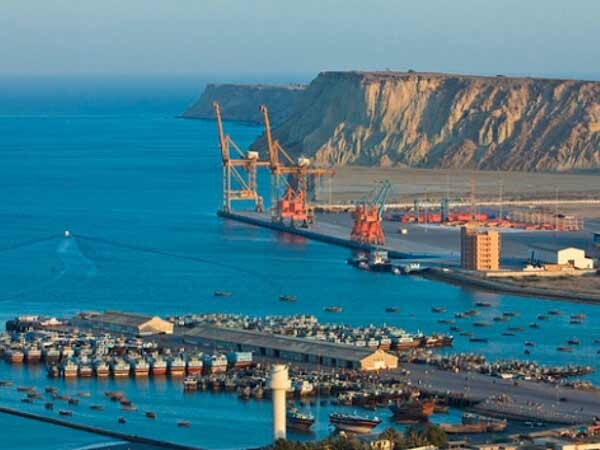Prosperous Balochistan is actually prosperous China

Balochistan [Pakistan], Dec 1 (ANI): China changes its attitude towards Pakistan according to its convenience, as it has projected Gwadar port's development aggressively and dignified it with the title 'Gateway City' under the USD 62 billion China-Pakistan Economic Corridor (CPEC), but the whole drive to make Balochistan "prosperous" (Khush Hal Balochistan) will only lead to China's prosperity, says an expert.
Renowned contemporary Pakistani artist, Mir Mohammad Ali Talpuri, in an article titled, "Khush Hal Balochistan or Khush Hal China?" published in Balochistan Times, has opined that even though the finance to make Balochistan 'Khush Hal' would be coming from China under the CPEC, but the Chinese money could create conditions for a 'Khush Hal' China, citing Beijing's supposed 'all weather friendship' with Islamabad "seems to cool down in winters."
He further wrote, "It should be understood that those who lend money do so in hope of profiting and expecting them to be altruistic is sheer folly."
"The Gwadar Port is now, like Hambantota, a Chinese port what more will be taken of the resources and land that has been hocked in Balochistan, as Gwadar Port was, by Pakistan will only become apparent as Pakistan defaults on the loans it is so greedily devouring today. The end result for all purposes will be a more Khush Hal China and definitely not a Khush Hal Balochistan," he added.
"The trade at the Khunjerab border usually continued till end of December but this year despite Pakistan Embassy requests they are refusing to budge from the November 30th date and consequently the goods lying on the both sides of border will not be picked and traders will suffer loss of billions," the author further commented.
Claiming that "only Chinese transporters are allowed to ferry goods" the author went on to express concern over the sharing of profit as the 91 per cent of the revenue generated through Gwadar port, as part of the CPEC, would go to China.
"On November 24, the Federal Minister for Ports and Shipping Mir Hasil Bizenjo disclosed in the Senate that that 91 per cent, yes 91 per cent, of the revenues to be generated from the Gwadar port as part of the China-Pakistan Economic Corridor (CPEC) would go to China, while the Gwadar Port Authority would get only 9 per cent share in the income for the next 40 years," Talpurin said.
"This 91 per cent is for the starters only and to understand which way the benefits, will if any, from the CPEC go you can decide from some recent indications and past record," he added.
Talpurin further quoted a news report mentioning that how Pakistan rejected China's suggestion to use Yuan in Gwadar.
The news report said, "The recent Senior Officials Meeting (SOM) of Chinese and Pakistani officials that the Pakistan had again rejected the Chinese suggestion of use of Chinese currency in Gwadar because they want to avoid currency exchange risks attached with the use of the United States dollar and the Pakistani rupee."
"However, this suggestion was shot down by the Pakistani side arguing any such move would compromise its 'economic sovereignty'," the report said.
The author highlighted the major issues in China- Pakistan trade relations, which are in some or the other way affecting the people of Balochistan, already fighting the oppression from the Pakistan authorities.
"One issue was related to the size revolving fund and the other to operation and maintenance of the project. The revolving fund, according to the officials, is required to be set up for making payments to the Chinese company in case its bills are delayed," he wrote.
The second major issue relates to the operation and maintenance of the project.
"The Chinese want the government [National Transmission and Despatcher Company or NTDC] to purchase spare parts from China on its own and supply it for the operation and maintenance of the project," he added.
The author then said that the Gwadar and Baloch people don't just have have to fear from the Renminbi (RMB) i.e. the Yuan as there are more ominous things that worry them and endanger their liberty and dignity.
"Plans to issue 'residency cards' to people there are on the anvil. The residency card will ensure that they can shape the demography the way they want; who will hear the protests of the natives who are denied residency," he questioned.
The author also mentioned the plight of the fishermen and locals, which is also compounded by security when important people come.
China has also shown deep interest in agriculture, concluded the author, quoting a July 21st 2017 report by Khurram Husain in 'Dawn'.
The report said, "For agriculture, the plan outlines an engagement that runs from one end of the supply chain all the way to the other. From provision of seeds and other inputs, like fertiliser, credit and pesticides, Chinese enterprises will also operate their own farms, processing facilities for fruits and vegetables and grain. Logistics companies will operate a large storage and transportation system for agrarian produce." (ANI)
This story has not been edited. It has been published as provided by ANI





























